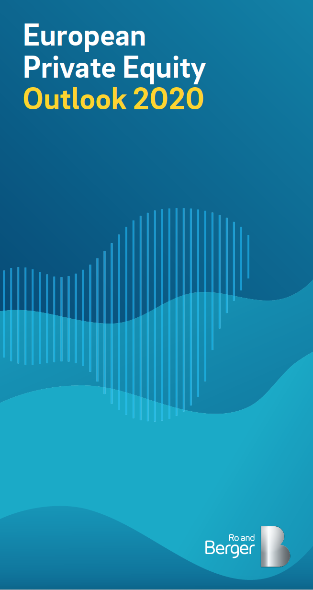European Private Equity Outlook 2020
![{[downloads[language].preview]}](https://www.rolandberger.com/publications/publication_image/Roland_Berger_STU_616_European_PE_Cover_Image_download_preview.png)
Sustainable and resilient business models will be key for private equity portfolio development in Europe in 2020 in order to curb economic uncertainty.


"Investments in stable companies that are less susceptible to economic fluctuations are considered to be the most effective measures to prepare for a downturn."
The private equity industry is cautiously optimistic about 2020, thanks to a more stable outlook for M&A transactions with PE involvement. The issue of sustainability will have an increasingly concrete impact on investment behavior in the PE industry, as it experienced the highest increase in importance as a portfolio value creation measure from 2019. These are the key findings of the "European Private Equity Outlook 2020," for which Roland Berger surveyed PE experts across Europe.
Around a third of respondents expect the number of completed M&A transactions with PE involvement to remain unchanged in 2020, up from just 21 percent of experts from our Private Equity Outlook 2019 , who expected stability last year. This means that the private equity outlook should remain constant over the coming year. Yet the overall economic outlook is considered less favorable, with 70 percent of experts in Europe preparing for a potential economic slowdown. What is the best way to deal with this economic uncertainty? The experts point to resilient and sustainable companies.
Environmental sustainability saw the most marked growth in importance in portfolio management with an increase of five percentage points compared to 2019. Greater attention to sustainability reflects both the public’s strong sensitivity to environmental issues, as well as the rising importance of climate compatibility in the valuation of assets. It is set to become a key component of many PE portfolios in the future.
While environmental sustainability is growing the most traction, cycle resilience of portfolio companies is considered by most respondents (19%) to be the most important value creation measure for 2020. This could be due to the foreseen slight decline (42% of experts) in the European economy this year. A weakening economy naturally leads to investments in cyclically resilient companies and weatherproof programs, as they provide safer, longer-term solutions. In line with this, prolongation of existing funds has increased by over 10 percentage points in from 2019 to become the highest focus for PE activity. The reduced interest in new business may be due to overvaluation in the market, which 94 percent of PE professionals currently perceive, but can also be attributed to the uncertain economic climate.
The economic situation should remain strong for Scandinavia, partially why the region is expected to experience the highest growth in private equity M&A activities compared to 2019 (2.3%). The experts also anticipate a catch-up effect for Italy and Greece in 2020, with growth of 1.5 and 1.4 percent respectively, and stability for Great Britain, France and DACH, as reflected in our Private Equity Newsletter .
In 2020, most survey participants (90%) expect Technology, Software & Media to yield the highest number of M&A deals with PE involvement, as investors continue to be interested in companies with innovative technological approaches, from which growth rates are expected in coming years. Pharma & Healthcare (81%) and Business Services & Logistics (59%) also remain important industries, while M&A activity will be lowest for the automotive (7%) and building and construction industries (11%).
You can download the short version of the study directly from this page or obtain the complete study by registering below.

![{[downloads[language].preview]}](https://www.rolandberger.com/publications/publication_image/Roland_Berger_STU_616_European_PE_Cover_Image_download_preview.png)
Sustainable and resilient business models will be key for private equity portfolio development in Europe in 2020 in order to curb economic uncertainty.